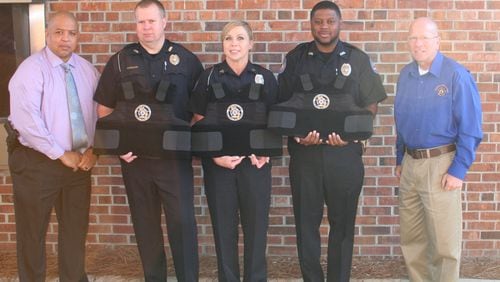People across Georgia are getting telephone calls from a deep-voiced solicitor who sounds sort of like a real person, and a little like a computer. He’s calling, he says, on behalf of the Fraternal Order of Police- Georgia State Lodge.
The group needs money, he says, to pay for bulletproof vests, to help families of officers injured or killed in the line of duty and to operate its lodge. Plenty of Georgians have answered these calls for help: The most recent annual campaign brought in donations of $556,220.
That could have paid for hundreds of life-saving vests and funded all sorts of programs for grieving families. But that’s not what happened.
Under the fundraising model that the Georgia Fraternal Order of Police has been using for years, a for-profit New Jersey-based fundraising company kept more than 80 percent of the money Georgians donated.
Even the small slice of the money that did make it to the Georgia group was spent primarily on lodge operating expenses, lobbying and the cost of hosting meetings at hotels around the state – not on fallen officers’ families and bullet-stopping vests, The Atlanta Journal-Constitution found.
Tracking the money trail from the telemarketer’s successful pitch to the last dime spent offers a telling example of how well-intentioned donors can sometimes end up paying for very little actual charitable work, especially when a telemarketer is involved in bringing in the cash.
The Georgia group acknowledged that most donors probably have no idea that a for-profit company pockets most of the money they donate.
“To be honest, I do not donate to any telemarketer,” said Steve Gaynor, an executive board member of the group.
But Gaynor said the group is committed to the fundraising model.
“At this point,” he said,”it’s the only way we have been able to conduct business.”
Fundraising model
Georgia’s Fraternal Order of Police is a tax-exempt organization, but contributions aren’t tax deductible because of its IRS classification as a fraternal group. As the “voice of law enforcement professionals,” the group is focused on improving working conditions of its members — law enforcement officers. Through local lodges and state and national umbrella lodges, the group lobbies and offers insurance benefits and legal representation, as well as doing some charitable work.
While members pay dues, the state group has for years relied on donations raised by paid fundraisers to cover much of its budget. Gaynor said some of the larger local lodges in Georgia use telemarketers too, with a similar split going to the paid callers.
The Georgia State Lodge uses New Jersey-based Residential Programs Inc. to make its calls. Under its contract, Residential is paid 81.5 percent of the money raised, while the police group is guaranteed $80,000 a year.
The fundraising company did not respond to calls from The Atlanta Journal-Constitution.
Before its contract with Residential, the Georgia group relied on another New Jersey-based fundraiser, Civic Development Group.
But in a Federal Trade Commission case over its fundraising for police, firefighters and veterans groups, Civic was accused of misleading consumers. While the fundraisers said donations would go directly to the charities, FTC said, in fact Civic kept all but a small slice of the money.
To settle the case, in 2010 Civic and its owners agreed to pay $18.8 million and the company’s owners had to agree to get out of the fundraising business and turn over lavish assets. They included a $2 million home, paintings by Picasso and Van Gogh, a guitar collection worth $800,000, and several Mercedes vehicles, two Bentleys and other luxury cars.
“My understanding is we bailed out when they got into trouble,” Gaynor said.
Residential’s president was identified in a news report from the 1990s as an employee of Civic Development at that time. On its website, Residential says it was formed by people who had worked for other commercial fundraisers.
Tugging on heartstrings
If specifically asked by a potential donor, a telemarketer must reveal how much of each donation a charity will actually get. When asked about the split during a recent call on behalf of the Georgia Fraternal Order of Police, a caller working for Residential Programs said the charity would get “no less than 10 percent” of the money raised.
Most people don’t ask callers that question, said Doug White, a national expert on non-profit organizations. If they did, he said, they would often find out that the cut the Georgia group gets is fairly typical among commercial fundraisers.
“And it’s pretty wrong, in my view,” White added.
He said that most telemarketers tug on potential donors’ heartstrings when asking for money. That’s why they emphasize the needs of cops who are injured and police departments that can’t afford bulletproof vests.
If a donor finds out that only a few cents of every donated dollar actually goes to those needs, White said, “You see how the heartstrings are kind of broken.”
Still, the practice is legal, said White, pointing to a 2003 ruling by the U.S. Supreme Court, which said that high fees for fundraising companies aren’t fraudulent unless the telemarketers actually lie about how much money will end up going to a charity.
Tracking the dollars
The Georgia Fraternal Order of Police got $90,756 through telemarketing last year. It spent $13,000 on the bulletproof vests that are pitched in the calls, according to its budget.
What about the families of officers killed in the line of duty? Gaynor said the group sends a representative to Washington, D.C. when a Georgia family is there to see a loved one’s name added to the National Law Enforcement Officers Memorial.
Another organization pays for the family’s travel to the event. The Georgia order’s representative is there to support the family if needed, he said.
Last year, that program cost $2,339.
The group spent more on lobbying in 2016 — $19,000 — than on its vests and D.C. trips to be with the grieving families.
Another Georgia law enforcement organization that raises money for a charitable purpose takes an old-fashioned approach to asking for donations.
“All of our fundraising, as far as contacting the public, is done through the mail,” said J. Terry Norris, executive director of the Georgia Sheriffs’ Association and the Georgia Sheriffs’ Youth Homes. “We would never call anybody unless they told us to call them.”
In addition to its support and training programs for the state’s sheriffs, the association runs homes around the state for abandoned and neglected children. A loyal group of Georgia donors know the charity’s mission and respond when they get a letter asking for a contribution, Norris said. The fundraising is done in house, he said.
Norris said he thinks highly of the Fraternal Order of Police and that it’s an important group for law enforcement.
But he said his organization is representing the state’s sheriffs in everything it does, including fundraising, which is one reason the association has made a point of publicizing that it does not use telemarketers.
“People want to know that most of the money they give is going for the purpose for which they give it,” Norris said.
Gaynor said his group once tried letters to raise cash, but it didn’t get much response. He said he encourages donors who want to support the law enforcement organization to send checks to the office directly or donate online so the group gets all the money.
“We are always open to new ideas,” Gaynor said, “but right now in order to continue these great programs, we have chosen this option.”







